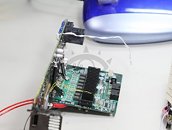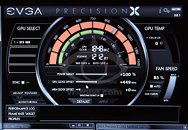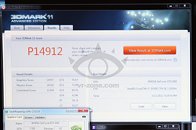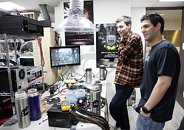- Joined
- Oct 9, 2007
- Messages
- 47,466 (7.50/day)
- Location
- Hyderabad, India
| System Name | RBMK-1000 |
|---|---|
| Processor | AMD Ryzen 7 5700G |
| Motherboard | ASUS ROG Strix B450-E Gaming |
| Cooling | DeepCool Gammax L240 V2 |
| Memory | 2x 8GB G.Skill Sniper X |
| Video Card(s) | Palit GeForce RTX 2080 SUPER GameRock |
| Storage | Western Digital Black NVMe 512GB |
| Display(s) | BenQ 1440p 60 Hz 27-inch |
| Case | Corsair Carbide 100R |
| Audio Device(s) | ASUS SupremeFX S1220A |
| Power Supply | Cooler Master MWE Gold 650W |
| Mouse | ASUS ROG Strix Impact |
| Keyboard | Gamdias Hermes E2 |
| Software | Windows 11 Pro |
Thought the 1800/7700 MHz Radeon HD 7970 OC feat involving an MSI R7970 Lightning was impressive, wait till you see what the punters at EVGA, with K|ngp|n have in store. Armed with NVIDIA GeForce GTX 680 graphics cards, augmented by EVGA EPower board, and PrecisionX software, the EVGA GTX 680 was able to crack the 1800 MHz core frequency mark, reaching 1842 MHz, powered by a core voltage of 1.212V. Interestingly, the memory clock offset wasn't tinkered with. The rest of the system consisted of a Core i7-3960X clocked at ~5.50 GHz. The bench was stable enough to score 14912 points at 3DMark 11 (performance preset). Compare this, to the R7970 Lightning clocked at 1800 MHz core, 7.70 GHz memory (370 GB/s bandwidth), with no additional soldering except plugging in the GPU Reactor, and a slower Core i7-3960X CPU (clocked at 5.00 GHz), which went on to score P15035. Luckily for EVGA, the overclocking feat hasn't ended, and is still work in progress.




View at TechPowerUp Main Site




View at TechPowerUp Main Site




 and go nvidia
and go nvidia 





 at least this card should start a price war and prices can only go down hopefuly.
at least this card should start a price war and prices can only go down hopefuly.

